Psychology is an integral part of a good cannon’s skill-set. He must be able to read the mark. More than one good pickpocket has told us that the rush is better than a drug high (which many have the experience to compare), when he sinks his hand into a mark’s pocket and touches a wallet, even if there’s no actual extraction. Just being there—inside a complete stranger’s pocket—is a rush. Pickpockets often come up with nothing, for many reasons. The poke was lying sideways in the pocket. It was too thick. In a woman’s handbag, the zipper opening was not large enough to let the wallet slide out, The mark made a move sideways, or suddenly changed face expression (to anger or strain). Grift sense informs the pickpocket’s next move in the game.
Early this month, Germany’s RTL Television Network sent for Bambi and me for its program, Extra. Over the past six or seven years I’ve had several segments on RTL’s Extra, all with high ratings; which may explain why the network flew two people all the way from Las Vegas to do only a ten-minute spot in a one-hour news-program.

This time the assignment was different and demanding. The producer, Burkhard Kress, wanted me to steal from the public at Munich’s enormous Oktoberfest, where more than eight million people congregate over a two week period. The goal was to illustrate why pickpockets love crowds, and that Oktoberfest is a strong magnet to international cannons.
During the festival, hundreds of international pickpockets descend on Munich and practice their trade, not just on the fairgrounds, but also on public transportation, in hotel lobbies, and everywhere tipsy revelers rally—pickpocket heaven for sneak thieves. Cannons who usually operate in St. Petersburg, Bucharest, Rome, Naples, Athens, Paris, Marseilles, Barcelona, Lima, and Santiago, to mention just a few cities with a high level of whiz mob activity, come to Munich for the festival with hope of making a big kill.
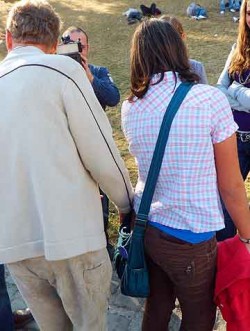
My challenge was especially tough because I couldn’t operate in the same environments or locales as my criminal colleagues, and had to work with serious limitations and restrictions. First of all, there was a time issue. We had only two days for the project. That meant starting work immediately upon arrival in Munich (from Las Vegas), without being able to first scout the venues, the crowds, the hidden cameras, where the undercover cops were patrolling, and where the best spots were to extract the pokes without being caught by law enforcement.
And RTL wanted “money-shots”—all television programs seek these emotional moments. They’re what drive viewers and ratings. They make for tense television and, most important, they stop viewers from switching to other stations. It’s why programs like America’s Got Talent are actually scripted, dripping with confrontational emotion when participants are ejected from the show.

The television money-shot in pickpocketing is when the reporter asks the victim about safety, and how he or she perceives the threat of theft and cons. The questions are usually: “So how do you feel about pickpockets? Could one steal from you?” The answer, hopefully, will be a confident: “No way, I’m too aware, my stuff couldn’t be stolen.”
Packed into this two-day visit, we had scheduled camera shoots (me stealing from the crowd), interviews of me, my analysis of security at Oktoberfest, and lessons in theft-avoidance. We also needed time to transfer some of my crime footage that illustrates new pickpocket techniques relevant to Germany and its visitors and viewers. A project like this really needs five days.
We arrived at the hotel and changed into the working uniform, this time traditional lederhosen. We rigged cameras and wireless microphones, experimental wrist-rigs, and the usual button-cams. We also had to take into account the local laws, like what can be filmed with audio (privacy laws).
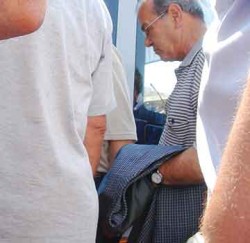
Next step was a briefing with the film crew to make sure everyone understood the logistics of filming thievery. Cannons will always shield the hand going into a pocket or purse with a jacket, a bag hanging sideways over the chest, or something. This allows the thief to hide his entry into the victim’s pocket, purse, or fanny-pack and the world around won’t see the extraction. My challenge was to keep my theft hidden from the vic and his friends while enabling the camera crew to film it.
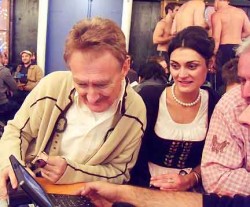
I work fast, and my hands often fly lightly all over my mark. Usually, Bambi is the only one who can anticipate the item I’m after and where to point the camera. She was thrown a camera and became one of the crew.
Most of the drinking and much of the partying at Oktoberfest takes place in the many enormous beer-halls on the grounds, huge tented restaurants which are each sponsored by a different company. RTL did not receive permission for me steal inside the tents, where the crowds were dense, but the police knew that I was working with the film team at the festival. Therefore, we had to be aware of surveillance cameras and how they were monitored. Were they actively watched by humans, or was it a system that simply records everything so that officers can go back and view footage in case of an incident?
I also wanted to avoid the inebriated. Partiers were putting away six or seven one-liter mugs of prime Oktoberfest beer. Stealing from a drunk does not make for great television in my opinion—among criminal street pickpockets this is ranked at the lowest level. It’s entry level thievery and gets no respect from the whiz mobs. They call this kind of lowlife a lush worker.
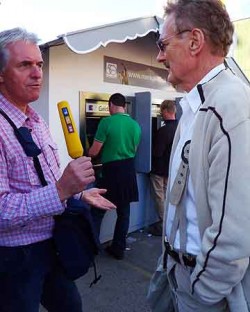
I hung around a row of ATMs for a while to watch for a taschendieb or two on the lookout for good marks. A team of four caught my eye. I was itching to go up and introduce myself—talk shop. It usually takes me thirty seconds to determine in a conversation if they’re thieves or not. But there was a fly in the soup here. Oktoberfest management had hired undercover cops from Romania to look for Romanian pickpockets and these guys could have been them. My suspects spoke only Italian and one of them just a tad of English. Yes, we had fun talking, but I didn’t get the confirmation I hoped for.
One by one, a few good potential marks walked away from the ATM after cash withdrawals. I telegraphed to the film crew that I was ready to go into action and got an approving nod: “go for it.” I lifted a few wallets and we got superb money-shot reactions when we returned them. It was “in the can,” and everyone was happy.
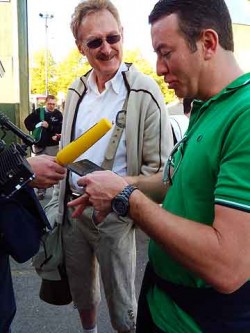
What made this spot so successful? First and foremost, I saw where the marks placed their leathers (slang for wallets) and how thick they were. I could immediately determine the print of the poke. Translation: the four corners of the wallet and where the top of it was in relation to the top of the pocket—how deep down it was. That’s significant information because it allows the me to pick a technique of extraction: what fingers to use and where to grip. Yes, there are different methods to extract a wallet.
In an ideal scenario you want to nip the top edge with your nails and stay still while the mark moves away, he simply walks away from his property. The vic’s own motion hides the sensation of the poke sliding out. An alternative, for a good cannon, is to create a small diversion when the leather is lifted. A light brush against the legs is enough, or perhaps a more demonstrative push by a female whiz mob partner (or a stall). Each extraction need a slightly different approach and technique. Is he in motion or standing still?, how tight is the crowd around him?, and so on. Each factor counts and on top of it all, the equation changes constantly depending on my read of the mark’s face. Pickpockets call this skill—reading their marks—grift sense.
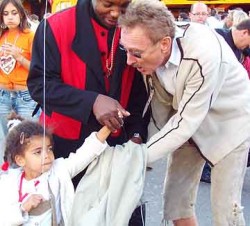
In the two days, I made several misses—as any cannon does. Yes, I had my hand in the purse or bag, but there was nothing significant to pull out. In one case, when I was about take an entire handbag from a woman sitting on a bench, I saw that she suddenly got uncomfortable with my presence. Another time a man’s wallet was too thick for me to remove smoothly. These are typical complications which all pickpockets experience.
A good cannon will seldom lift more than three or four pokes in a day due to the sheer tension involved. Some will target their marks carefully, knowing from the appearance of the mark that he or she is likely to have a generous interpretation of “pocket money,” and a high credit card limit. One wallet, when targeted like this, should translate to quite a few thousand dollars by maxing out credit cards. Identity theft is the next natural progression for a good pick. If the whiz mob is technically inclined, they garnered the PIN while the vic made a transaction at the ATM. Europe’s chip & pin cards make this harder to accomplish, but that’s another story.
We had a lot of fun in Munich and I was again able to test my slippery skills in real life scenarios. As a stage pickpocket, I find the level of tension much higher when stealing without the protection of the theater setting. Street thieves call it having heart; and that doesn’t mean having compassion for your vics. It’s the exact opposite: the ability to put your hand in a total stranger’s pocket and be emotionally unaffected by it—feeling cool under pressure. Having heart also means one must have lived at least for some time in the criminal world, and knows the consequences of being arrested and spending time in the box. Though I’ve never been arrested, I think I can still consider myself as having heart. Except, for me, it does mean having compassion for the victim.

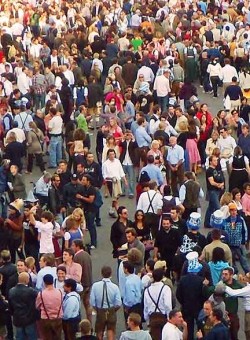





2 Comments
Gorgeous. So well written. Informative. This is going to sound trivial and banal, but it really is ‘another world’. Thanks for doing this, thanks for taking the time.
[…] pickpockets, in our opinion—scanning the crowds. Time was short though; Bob was supposed to steal from sober partiers. No time for thiefhunting. We stood on a grassy slope among the sick and sleeping, the singing, the […]